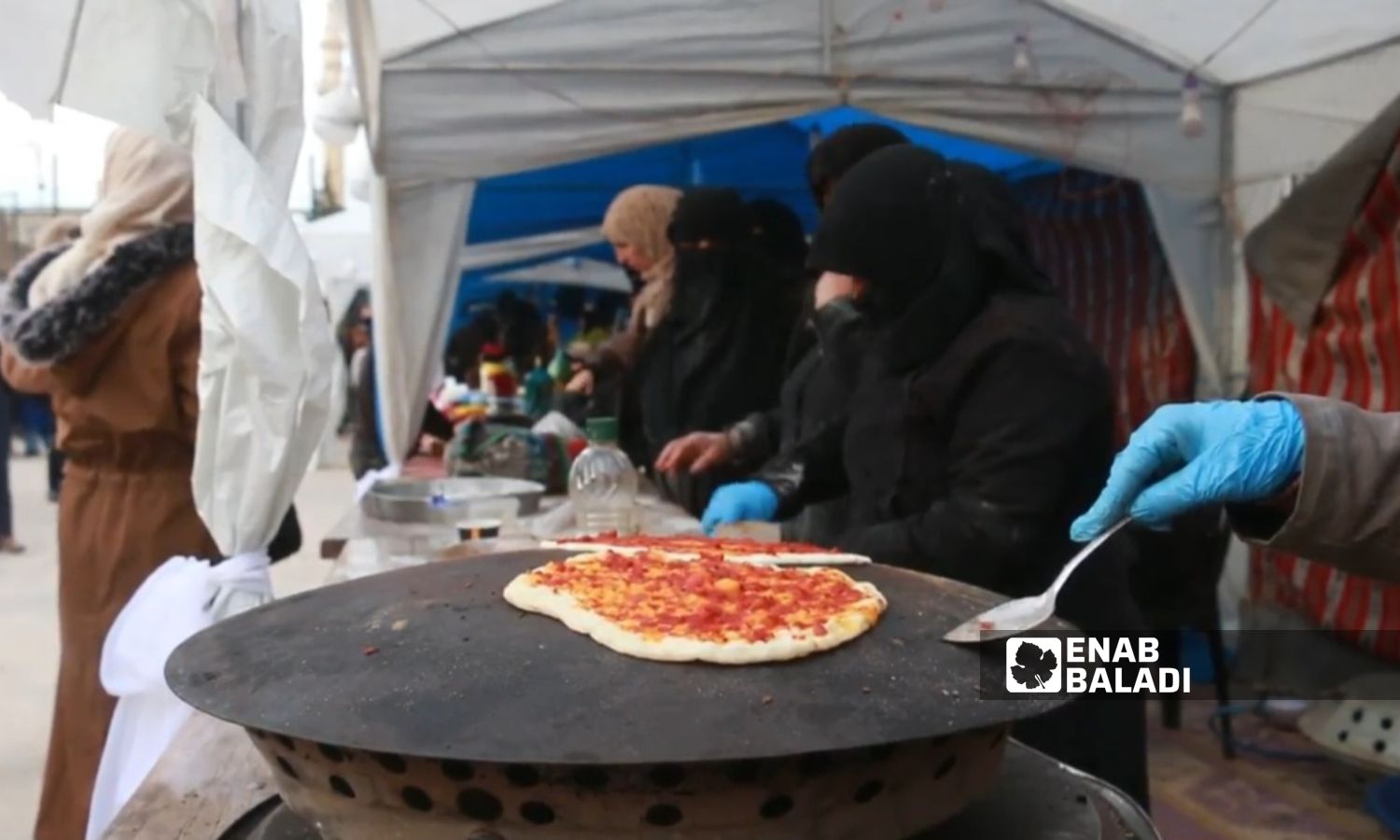



Enab Baladi – Dayan Junpaz
Since April 2023, Fareeda Makki, a Syrian woman living in northwest Syria, began her business cooking and preparing food for sale to generate an income.
Makki, residing in Azaz in the northern Aleppo countryside, earns enough from her project to meet her family’s needs, with her husband contributing to the expenses.
She faced difficulties securing the equipment and materials needed to start her cooking venture, but she eventually overcame these challenges.
Makki told Enab Baladi that the prices of her products are not high and are affordable for her customers, and the most sought-after dishes are Yalanji (stuffed grape leaves), grilled and fried kibbeh (meatballs), sambusak (stuffed pastry), and Shish Barak (dumplings).
The woman fulfills all the requested food orders, expressing that she received support and encouragement from her community to choose this project.
Makki sells her food in ready-to-eat meals, some designed for a single person, with a Yalanji dish costing 60 Turkish lira, a mahshi dish (stuffed vegetables) for 75 lira, sambusak for 60 lira, a kilo of fried kibbeh for 250 lira, two pieces of grilled kibbeh for 25 lira, and a mansaf with lamb meat for five people for 600 lira. These prices are lower compared to those of restaurants.
Fareeda Makki is not the only woman whose financial circumstances have led her to create a home-based project yielding an income to help her family. There are other women in Azaz who rely on their cooking skills to earn money and meet the needs of their families.
These home-based projects are active in an area suffering from a poor economic and living situation, where daily wages in the countryside of Aleppo vary between 60 and 100 Turkish lira (averaging three dollars), differing depending on the number of working hours and the nature of the profession from agriculture, handicrafts, or construction work.
Mahasen al-Hamed, displaced from Deir Ezzor, continued her previous work making saj bread (flatbread) and manakish (flatbread covered with various toppings), and she stated to Enab Baladi that she works from her home to meet the expenses of her family of six.
Al-Hamed’s work is limited to making bread and manakish, which she sells to residents of her neighborhood in Azaz, north of Aleppo. The quantity varies daily, with her earning up to 3000 Turkish lira monthly, and about 1500 lira when demand decreases.
Al-Hamed fills orders using a home oven, starting her business gradually without significant capital.
Khadija al-Hafez, another woman residing in Azaz, established a project to sell food supplies three years ago, passionate about this activity, viewing it as a source of income, according to her conversation with Enab Baladi.
Al-Hafez told Enab Baladi that she initially created a group on Facebook and then on WhatsApp, adding customers to it to facilitate orders and home delivery of orders increased the number of customers.
Some challenges that al-Hafez and her husband face include delivering orders on a motorbike without having a car to facilitate their work, as well as securing and storing products until the next season, which requires significant funding.
The woman’s profits amount to 10% of the sales volume, noting that she succeeded in preparing and selling summer food supplies like mulukhiyah and makdous during the summer of 2023.
Al-Hafez sells a kilogram of vine leaves for 125 Turkish lira, a kilo of black olives for 85 lira, a kilogram of jams (cherry, pumpkin, fig, apricot, rose) for 95 lira, 1.5 kilograms of crushed tomatoes for 60 lira, and a kilo of pomegranate molasses for 125 lira, a kilo of makdous for 115 lira, and a kilo of animal ghee for 285 lira.
Al-Hafez pointed out that her customers are satisfied with the products she offers, which she described as the “fruit of her success,” with most of her customers being employees and students who do not have the time to cook.
In the northwest areas of Syria, projects supervised by women are active and represent a source of income for their families. Additionally, institutes and centers offering training courses in various fields are active, and supported by organizations and local entities.
Young women in Azaz are engaged in creative projects and activities they design themselves, to achieve a modest financial return and pursue their passions, including accessories and embroidering artistic panels.
Moreover, many residents in northwestern Syria face difficult economic conditions amidst a decline in purchasing power and a scarcity of jobs. The recognized poverty line in the northwest regions of Syria is 9,314 Turkish lira, and the extreme poverty line is 6,981 lira, according to the Syrian Response Coordination Group (SRCG) working in the region.
if you think the article contain wrong information or you have additional details Send Correction